The European Commission has quietly advanced a proposal to maintain tariff preferences for produce grown in Western Sahara, a territory occupied by Morocco. The move reflects the EU’s determination to safeguard ties with Morocco which is the bloc’s key agricultural and strategic partner in North Africa.
The Commission’s proposal to amend the trade agreement with Morocco intends to comply with the Court of Justice of the EU’s (CJEU) ruling. In October 2024, the CJEU ruled that the existing agreement between the EU and Morocco, signed in 2019, was contrary to the principle of self-determination of the people of Western Sahara. This is a territory that Morocco has occupied since 1975 in violation of international law.
Western Sahara, disputed territory
Western Sahara is recognised by the United Nations as a non-self-governing territory. Its status remains disputed. Morocco keeps claiming sovereignty, but Polisario Front (Sahrawi independence movement), , demands self-determination.
Western Sahara is a vast, albeit sparsely populated territory. Just over half a million people live in an area of 270,000 km2. However, the region has very rich phosphate deposits and the coastal waters are full of fish. In recent years, irrigated agriculture has been expanding massively.
The CJEU had previously ruled that goods from Western Sahara must be labelled as such, not as Moroccan. But enforcement has been weak. Moroccan authorities have angrily rejected the CJEU’s ruling and reaffirmed that Morocco’s sovereignty over the ’Moroccan Sahara’ is non-negotiable.
You might be interested
The Commission’s recent proposal for a trade agreement amendment now seeks to circumvent this problem. The amendment would keep Saharan exports within the EU-Morocco trade framework. It would also provide EU funding for local development in irrigation, energy, and anti-desertification, and support for Sahrawi camps in Algeria.
The formula is designed to align with the CJEU’s observation that trade preferences could remain valid if they generated “implicit consent” by benefiting the local population.
Morocco as a valued partner
Relations between the EU and Morocco have intensified in recent years. The EU is by far Morocco’s most important trading partner. Moreover, millions of Moroccans succesfully seek better-paid jobs in Europe.
On the other hand, Morocco is important to the EU as a barrier against illegal migration. Many migrants from sub-Saharan Africa choose to travel to Europe via Moroccan territory. In recent years, the EU has concluded a series of agreements with Morocco on the protection of national borders in exchange for financial aid and development projects.
The agricultural supply from Morocco to the EU has skyrocketed in the past few years and this is expected to continue. Morocco has invested heavily in transforming large parts of the desert into a horticultural hub. That includes the disputed territory of Western Sahara.
It is also expected that in the future large amounts of electricity generated in giant solar power plants will be exported from Morocco to Europe via long-distance cables.
Spanish farmers’ concerns grow
Reports of the planned amendment to the trade agreement have provoked a strong reaction, particularly in Spain, which is the destination for a significant proportion of Moroccan agricultural exports.
The Moroccan labelling system is fraudulent, providing unfair competition for European producers. — Andrés Góngora, Coordinator of Farmers’ and Livestock Breeders’ Organisations in Spain
Coordinator of Farmers’ and Livestock Breeders’ Organisations in Spain (COAG) criticised the agreement’s labelling system. Andrés Góngora, head of fruit and vegetables department at COAG, called it ‘fraudulent and deceptive’ as it involves selling products as Moroccan. “This is an unfair competition for European producers,” Mr Gongora said.
The Spanish agricultural unions demand ‘mandatory, clear and verifiable’ labelling. COAG has also denounced that the revision of the agreement harms the profitability of European fruit and vegetable farms and benefits large importing corporations, to the detriment of small and medium-sized farmers.











